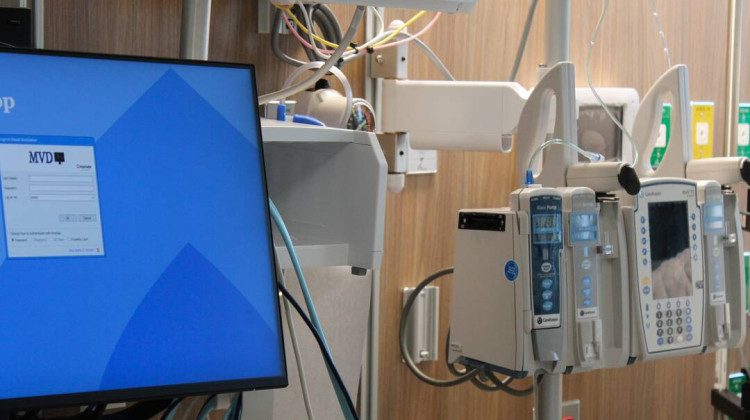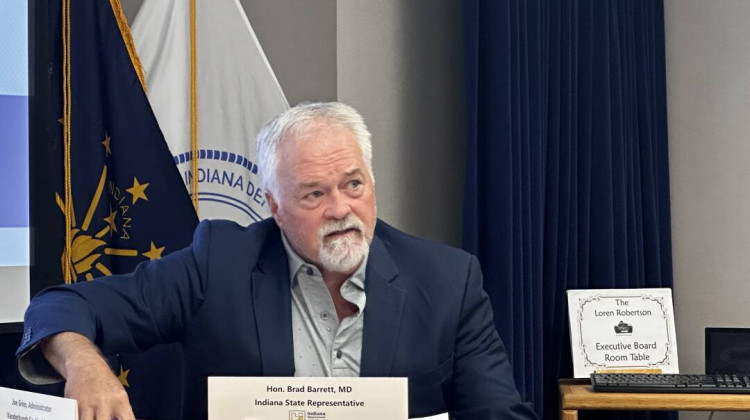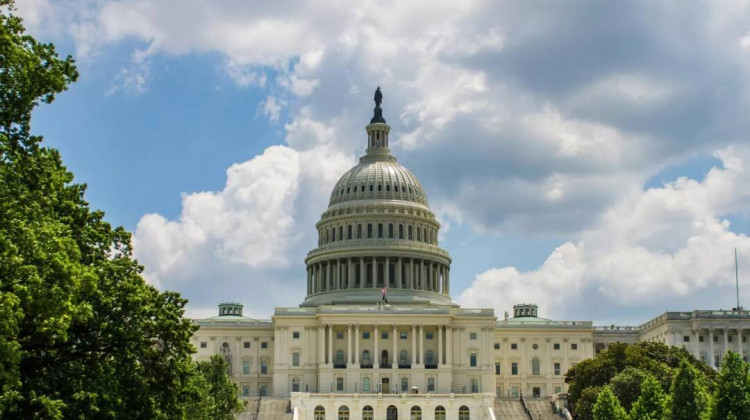
Photo caption: Indiana's voter registration deadline is Monday, Oct. 5. Registered voters who qualify can apply for an absentee ballot until Oct. 22.
Lauren Chapman/IPB NewsThe Indiana State Department of Health reported 93 additional confirmed deaths over the last week, bringing the state’s total to 3,447 – the highest in a single week since mid-June. The state announced more than 125,000 total confirmed cases – including three days with more than 1,000 reported cases – and more than 1.4 million Hoosiers tested.
Here are your statewide COVID-19 headlines from last week.
Holcomb Not Rethinking Lifted Restrictions As COVID-19 Data Trends In Wrong Direction
Gov. Eric Holcomb says he’s not rethinking his decision to lift almost all COVID-19 restrictions statewide, even as several COVID metrics have started to trend the wrong direction.
The state’s positivity rate is up and hospitalizations are at their highest level in a month. Two weeks ago, Indiana’s rate of COVID-19 spread was sixth best in the nation. It’s now fourth worst.
But Holcomb said Indiana doesn’t need to reimpose restrictions.
“It means we need to hunker down in the areas where we see spread,” Holcomb said.
Indiana's School COVID-19 Data Dashboard Is Public. Here's What You Need To Know
Indiana's data dashboard for school COVID-19 cases is now public, and the state's largest teachers union says it's a critical step to fight misinformation about what's happening in schools.
According to the dashboard 1,676 student cases have been reported since the start of the school year, with 678 cases reported among teachers and staff. Reported data shows 376 new cases during the week of Sept. 19.
Indiana State Teachers Association Vice President Jennifer Smith-Margraf said the availability of the dashboard is critical; without a reliable data source, people are more likely to hear and believe misinformation.
"They will fill in the blanks themselves, and often they will fill in the blanks with not the correct picture," she said.
The union played a key role in pressuring the state to put together the dashboard, but the reporting process is voluntary and doesn't reflect data from every school. Some are still being added or have chosen not to send information to the state out of concerns for student privacy.
As Schools Re-Evaluate, Teachers Say Remote Learning Is Burning Out Staff And Students
Many of Indiana's school leaders are grappling with tension in their communities as they consider how and when to bring more kids back into schools, but teachers say they're feeling more pressure than ever to manage classes in-person and online, as well as their own safety.
Most schools in Indiana started the new academic year with some sort of in-person instruction, but teachers say the so-called "hybrid" learning models are burning them out – fast.
Crawfordsville High School teacher Emily Race said her school is bringing most students back for in-person learning next week, but with some kids still learning online from home because of quarantine or safety concerns, she's not feeling any relief.
"So the only real change is that I have to create new seating charts to try to space out twice as many students in the same physical space," she said.
Race says many teachers are working into the evening and over the weekends just to keep up.
Monday Is The Last Day To Register To Vote For The 2020 General Election
Monday is the last day for Hoosiers to register to vote for the 2020 general election.
Hoosiers can register in-person at their county election administrator’s office – they have until the end of the business day to do so. But they have until midnight if they go online to IndianaVoters.com.
There, they can also look at who’s on their ballot and check early voting locations and hours in their county. Early, in-person voting begins Tuesday.
READ MORE: Can I Vote By Mail? Here's What You Need To Know For Indiana's Elections
And if they qualify, IndianaVoters.com is where Hoosiers can request an absentee, vote-by-mail ballot.
Indiana Must Count Mail-In Ballots Postmarked By Election Day, Rules Federal Judge
A federal judge is forcing Indiana to count all mail-in ballots that are postmarked by Election Day, Nov. 3, as long as they arrive to county clerks by Nov. 13.
That ruling comes in a lawsuit brought by Common Cause Indiana and the Indiana NAACP.
Indiana law only allows mail-in ballots to be counted if they physically arrive at the county election administrator’s office by noon on Election Day.
In Indiana’s primary this year, thousands of otherwise valid ballots were rejected because they came in after the deadline. And even without expanded vote-by-mail this election, Indiana expects a record number of mail-in ballots. Common Cause Indiana and the Indiana NAACP argued the "arbitrary" deadline will deprive thousands of their constitutional right to vote.

The state argued its deadline was necessary to help ensure orderly administration of its elections. But federal judge Sarah Evans Barker disagreed. She noted that Indiana already allows overseas voters' mail-in ballots to be counted if they come in up to 10 days after the election.
Vote-By-Mail Advocates Take Case To Federal Appeals Court
A group of Indiana residents trying to force the state to allow all Hoosier voters to cast mail-in ballots this year had their day in a federal appeals court Wednesday.
The suit was heard in the 7th Circuit Court of Appeals in Chicago.
A group of voters filed suit earlier this year in a bid to force Indiana officials to expand vote-by-mail to anyone who wanted it for the 2020 general election, just like the state did for the primary election, amid COVID-19.
The vote-by-mail advocates said without expanded mail-in options this fall, some Hoosiers will have to choose between risking their health by voting in person or not voting at all.
A federal district court judge already sided against those advocates, ruling that while the Constitution guarantees the right to vote, it does not guarantee the right to vote by mail.
Study: 3 Million Lost Employer-Sponsored Insurance Amid Unemployment Spike
More than 3 million Americans lost access to employer-sponsored health insurance during the summer months of the pandemic, according to a recent study by the nonprofit Urban Institute. But researchers say the numbers could have been much worse.
Anuj Gangopadhyaya is a health economist and research associate at Urban Institute’s Health Policy Center and one of the authors of the study. He says part of the reason it was lower – many lost jobs that were less likely to offer insurance, like hospitality and service jobs. Others found insurance elsewhere.
“One thing to keep in mind is, losing your employer-based coverage, that doesn’t necessarily have to translate into losing coverage altogether,” he said.
Join the conversation and sign up for the Indiana 2020 Two-Way. Text "elections" to 73224. Your comments and questions in response to our weekly text help us find the answers you need on COVID-19 and the 2020 election.
Gangopadhyaya says not everyone lost insurance right away, but instead found other forms of coverage, like the Affordable Care Act (ACA), other family members’ insurance or Medicaid, helping lower the number of uninsured.
He said the ACA, which has become a hot-button issue with the Supreme Court vacancy, helped many Americans become insured during the pandemic. According to the study, it lowered the likelihood of adults being uninsured by 35 percent. Gangopadhyaya said if the ACA is repealed, the link between employment and insurance coverage would be strengthened.
"Which is a rough thing to wrap your head around when you’re in the middle, not only of a recession, but a pandemic on top of that," Gangopadhyaya said.
All IN: What Has COVID-19 Revealed About Our Public Health Systems?
The COVID-19 pandemic hit the U.S. around seven months ago, and it's far from over. Were our public health systems ready to respond? A new scholarly article published by three researchers calls for the modernization of local and state public health systems.
All IN talked to the people behind the article to discuss the lessons they've learned from the pandemic, and the advice they have to make things better.
Grocery Union Continues Fight For Hazard Pay at Kroger Stores
The United Food and Commercial Workers union says it will continue to demand Kroger grocery stores give workers hazard pay during the pandemic. That comes as the company reported earnings grew more than 14 percent in 2020 compared to this time last year.
In a letter to Kroger, several UFCW chapters, including one representing Hoosiers, said their members deserve hazard pay for as long as potential health risks of COVID-19 remain. They said the threat to workers is even greater than months ago as the virus continues to spread. Earlier in the month, the company announced it expects to see continued growth in profits as people avoid eating out.
A UFCW 700 spokesperson said workers are “frustrated” and have a “bad taste in their mouths” seeing business boom without receiving pay to honor the risks they take at work. They said the union remains open to either retroactive or future hazard pay negotiations.
Contact Lauren at lchapman@wfyi.org or follow her on Twitter at @laurenechapman_.
 DONATE
DONATE








 Support WFYI. We can't do it without you.
Support WFYI. We can't do it without you.